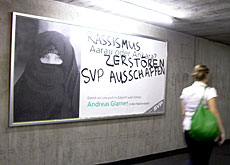
People’s Party becomes political black sheep

Abuses, conspiracies - and black sheep - have all featured in a controversial election campaign by the rightwing Swiss People’s Party.
The new, aggressive tone from the party ahead of October’s elections has come under fire both at home and abroad. But this may well have boosted the party’s prospects.
The message from Switzerland’s largest party – one of the four main political parties – is simple and repeated mantra-like: there is too much welfare abuse and young delinquency.
Foreigners also come under fire for allegedly abusing asylum laws and Swiss hospitality in general.
The answer to this, says the People’s Party, is deportation of foreign criminals – a stance made very clear in the rightwing party’s latest poster, which shows three white sheep kicking a black sheep over the Swiss border.
The party’s provocative campaign has already caused a furore both at home and abroad, coming in for criticism from Swiss President Micheline Calmy-Rey, other political parties and the Federal Racism Commission. There have also been strong words from the United Nations’ Rapporteur on Racism.
Last week, a leading British newspaper, The Independent, even went as far as to run a front-page report entitled: “Switzerland: Europe’s heart of darkness?”.
However, experts say criticism only helps attract attention to the campaign.
“The dominant topics of this election are all centred on the People’s Party’s campaign – its content but also its style with its personalisation of politics,” said Oscar Mazzoleni, head of the Observatory of Political Research in the Italian-speaking canton of Ticino.
“The party is using a strategy of attack, and is influencing the game plan of its opponents,” he added.
For or against?
Mazzoleni said the party was seeking to position itself with strong messages.
“The People’s Party is running a campaign which seeks to simplify the debate, taking clear-cut positions – for or against foreigners, in or out, and so on,” he said.
These tactics were forcing the other parties and the electorate to respond constantly to the People’s Party’s proposals, he said. And this is something new.
The expert said that for decades Swiss consensus-based politics and the “magic formula” multiparty government system meant that politicians had maintained a “non-aggression pact” which covered not only cabinet seat distribution but also campaigning methods.
“Effectively the People’s Party has broken this pact,” said Mazzoleni.
Experts point to another development – unanimous condemnation has allowed the People’s Party to position itself as a victim and to personalise the campaign.
The party recently denounced what it termed a “secret plot” by the other parties against justice minister and party leading light Christoph Blocher to exclude him from government.
“By sending out the message that ‘Blocher is in danger’ the People’s Party is managing to stir up the electorate and take the spotlight off the key issues for the other parties,” said political analyst Werner Seitz.
Seitz said that like the army and the church, parties and their proposals no longer commanded the same public attention as in earlier times.
Blocher’s role
“Voters are freer but find it more difficult to form views, given the complexity of the issues. The trend is to transform complex social questions into simple choices, such as are you for or against Blocher?” he said.
This can be demonstrated by the Blocher-Roschacher affair. Last week a parliamentary report criticised Blocher for his handling of former chief prosecutor Valentin Roschacher’s resignation.
The minister has also been accused in the Swiss press of plotting to oust Roschacher, a charge Blocher denies.
A number of politicians, not just from the People’s Party, have made unusually strong statements over the affair.
Mazzoleni says that until a decade ago, the stakes were low at election time, with only a few seats to be won or lost.
But since the 2003 election, when Blocher won a second People’s Party seat in cabinet at the expense of the centre-right Christian Democrats, the situation has become less clear-cut.
“This fosters a brand of campaigning more like in other European democracies: a battle with no holds barred,” said Mazzoleni.
swissinfo, based on an article in Italian by Armando Mombelli
The Swiss political system has been dominated for over half a century by four parties which account for 80% of the vote: the rightwing Swiss People’s Party, centre-left Social Democratic Party and the centre-right Radical Party and Christian Democratic Party.
Between 1957 and 2003, these parties shared out seats in government on the basis of a system known as the “magic formula”, with 2 going to the Radicals, 2 to the Social Democrats, 2 to the Christian Democrats and 1 to the People’s Party.
Until eight years ago, the People’s Party was the smallest of the four parties in government. In the 1999 and 2003 elections, however, it made great strides, becoming the largest party ahead of the Social Democrats.
Thanks to its four-year electoral success, the People’s Party obtained a second seat in government – at the expense of the Christian Democrats.
2003 elections results (figures from the latest opinion poll):
People’s Party: 26.7% (26.2%)
Social Democratic Party: 23.3% (22.8%)
Radical Party: 17.3% (15.8%)
Christian Democratic Party: 14.4% (15.2%)
Greens: 7.4% (9.5%)

In compliance with the JTI standards
More: SWI swissinfo.ch certified by the Journalism Trust Initiative





























You can find an overview of ongoing debates with our journalists here . Please join us!
If you want to start a conversation about a topic raised in this article or want to report factual errors, email us at english@swissinfo.ch.